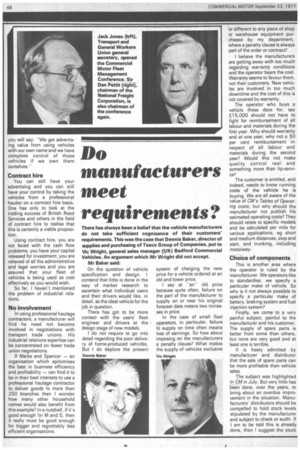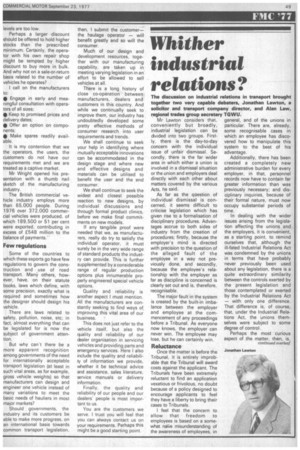Do manufacturers meet requirements?
Page 54

Page 55

If you've noticed an error in this article please click here to report it so we can fix it.
There has always been a belief that the vehicle manufacturers do not take sufficient cognisance of their customers' requirements. This was the case that Dennis Baker, director of supplies and purchasing of Tesco Group of Companies, put to Inc Wright, general sales manager (UK) Bedford Commercial Vehicles. An argument which Mr Wright did not accept.
Mr Baker said: On the question of vehicle specification and design, I contend that little is done in the way of market research to ascertain what individual users and their drivers would like, in detail, as the ideal vehicle for the job in question.
There has got to be more contact with the users' fleet engineer and drivers at the design stage of new models.
I do not require to go into detail regarding the poor delivery of home-produced vehicls. But I do deplore the present system of charging the new price for a vehicle ordered at an old and lower price.
I say at ''an" old price because quite often, failure on the part of the manufacturer to supply on or near his original forecast date means two increases in price.
In the case of small fleet operators, in particular, failure to supply on time often means loss of earnings. So how about imposing on the manufacturers a penalty clause? What makes the supply of vehicles exclusive
Vic Wright
or different to any piece of shop or warehouse equipment purchased by my department, where a penalty clause is always part of the order or contract?
I believe the manufacturers are getting away with too much regarding warranty conditions and the operator bears the cost. Warranty seems to favour them, not their customers. New vehicles are involved in too much downtime and the cost of this is not covered by warranty.
The operator who buys a vehicle these days for, say El 5,000 should not have to fight for reimbursement of all labour and materials during the first year. Why should warranty end at one year; why not a 50 per cent reimbursement in respect of all labour and materials during the second year? Would this not make quality control real and something more than lip-service?
The customer is entitled, and indeed, needs to know running costs of the vehicle he is buying. We are all aware of the value of CM's Tables of Operating costs; but why should the manufacturer not publish his estimated operating costs? They should relate to specific models and be calculated per mile for various applications, eg short and medium distances, stop and start, and trunking, including motorway.
Choice of components
This is another area where the operator is ruled by the manufacturer. We operators like to standardise; we specify a particular make of vehicle. So why is it not always possible to specify a particular make of battery, braking system and fuel injection system?
Finally, we come to a very painful subject, painful to the manufacturer and his customer. The supply of spare parts is better from some than others, but none are very good and at least one is terrible.
It is freely admitted by manufacturer and distributor that the sale of spare parts can be more profitable than vehicle sales.
The subject was highlighted in CM in July. But very little has been done, over the years, to bring about an overdue improvement in the situation. Manufacturers' distributors should be compelled to hold stock levels stipulated by the manufacturer and subject to check or audit. If I am to be told this is already done, then I suggest the stock levels are too low.
Perhaps a larger discount should be offered to hold higher stocks than the prescribed minimum. Certainly, the operator with his own repair shop might be tempted by higher discount to buy more in bulk. And why not on a sale-or-return basis related to the number of vehicles he operates?
I call on the manufacturers to: • Engage in early and meaningful consultation with operators of all sizes; • Keep to promised prices and delivery dates; • Offer an option on components; • Make spares readily available.
It is my contention that we the operators, the users, the customers do not have our requirements met and we are treated as a captive market.
Mr Wright opened his presentation with a thumb nail sketch of the manufacturing industry.
The British commercial vehicle industry employs more than 65,000 people. During 1976 over 372,000 commercial vehicles were produced, of which 189,500 or 51 per cent were exported, contributing in excess of £548 million to the balance of payments.
Few regulations
Some of the countries to which these exports go have few regulations to govern the construction and use of road transport. Many others, however, have, on their statute books, laws which define, with some precision, exactly what is required and sometimes how the designer should design his vehicle.
There are laws related to safety, pollution, noise, etc; in fact, almost everything that can be legislated for is now the subject of government attention.
But why can't there be a more apparent recognition among governments of the need for internationally acceptable transport legislation (at least in such vital areas, as for example, gross vehicle weights) so that manufacturers can design and engineer one vehicle instead of many variations to meet the basic needs of hauliers in most major markets?
Should governments, the industry and its customers be able to make more progress, on an international basis towards common transport legislation, then, I submit the customer— the haulage operator — will benefit greatly and so will the consumer.
Much of our design and development resources, together with our manufacturing capability, are taken up in meeting varying legislation in an' effort to be allowed to sell vehicles at all.
There is a long history of close co-operation between manufacturers, dealers and customers in this country. And while we continually seek to improve them, our industry has undoubtedly developed some pretty effective methods of consumer research into user requirements and trends.
We shall continue to seek your help in identifying where mutually acceptable innovations can be accommodated in the design stage and where new and effective designs and materials can be utilised to benefit the user and the end consumer.
We shall continue to seek the widest and closest possible reaction to new designs, by individual discussions and through formal product clinics, before we make final commitments on new models.
If any tangible proof were needed that we, as manufacturers, really do try to satisfy the individual operator, it must surely be in the very wide range of standard products the industry can provide. This is further supplemented by a considerable range of regular production options plus innumerable properly engineered special vehicle options.
Quality and reliability is another aspect I must mention. All the manufacturers are constantly seeking to find ways of improving this vital area of our business.
This does not just refer to the vehicle itself, but also the quality and reliability of our dealer organisation in servicing vehicles and providing parts and emergency services. Here I also include the quality and reliability of information we provide, whether it be technical advice and assistance, sales literature, service manuals or delivery information.
Finally, the quality and reliability of our people and our dealers' people is most important to us.
You are the customers we serve I trust you will feel that you can always contact us on your requirements. Perhaps this might be a good starting point.
































































































































